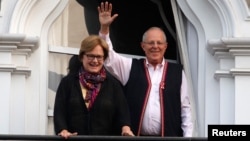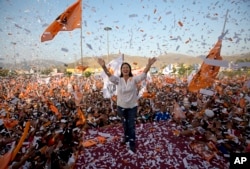Former Wall Street executive Pedro Pablo Kuczynski held a razor-thin lead over Keiko Fujimori, the daughter of an imprisoned former authoritarian leader, in Peru's closest presidential election in at least 50 years.
With 94 percent of votes processed by late Monday, Kuczynski led Fujimori by 0.56 percentage points, or just over 90,000 votes, and officials suggested it might take days to call a winner.
Fujimori had long been the favorite to win Sunday's election but Kuczynski caught up with her in final polls as Peruvians weighed the legacy of her father Alberto Fujimori, who was convicted of corruption and human rights abuse, and scandals involving her close advisers.
Despite the cliffhanger, the country was calm and market reaction was muted. Both candidates have promised policies that would be largely favorable to investors in the mining powerhouse.
Kuczynski, 77, appeared briefly on his balcony on Monday, dancing with his hands raised after kissing his American-born wife. Asked if he was concerned about the results, as the gap between the two candidates narrowed, Kuczynski shook his head.
"The ballots from abroad have not arrived! We'll talk tomorrow," he told journalists and fans who were gathered below.
Mariano Cucho, the head of the electoral office ONPE, said ballots from the Peruvian diaspora would begin to arrive Monday night, and some from far-flung provinces were still outstanding.
Representing nearly 4 percent of the possible electorate, foreign-based voters mostly live in the United States where Kuczynski, a former investment banker, stumped for votes in April.
A review of sample ballots by GfK pollster on Sunday showed Kuczynski had a nearly six-point lead over Fujimori among the diaspora.
Fujimori, 41, has not spoken in public since late Sunday night, when she told her orange-clad supporters to be patient after a quick count by two polling firms forecast a statistical tie with Kuczynski slightly ahead.
This could be Fujimori's second narrow loss in her quest for the presidency after outgoing President Ollanta Humala defeated her in 2011. But members of her party said they were still optimistic.
"As rural votes have come in, we're seeing the distance shortening," said lawmaker and ally Pedro Spadaro. "We're sure that with the share still missing that we'll be able to reverse the situation and of course come in first."
Disputed Ballots
While international observers said there was no indication of fraud, the close vote raised the specter of disputed ballots dragging out the decision.
Cucho said earlier on Monday, when about 90 percent of votes had been processed, that 1.5 percent were being disputed.
While disputes over ballots are common in Peru, where voting is mandatory and volunteer observers can lodge complaints, they have not played a significant role in recent presidential elections that ended with candidates conceding defeat before a full vote count is complete.
Kuczynski, a former prime minister and World Bank economist, portrayed himself as an honest and experienced leader who would clean up corruption, ensure every town in Peru has piped water and revive economic growth that has slowed on weaker prices for Peru's mineral exports.
Fujimori has promised to take an iron-fist approach to crime, the top voter concern, while ramping up spending on scores of infrastructure projects from reservoirs to roads.






